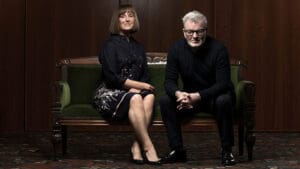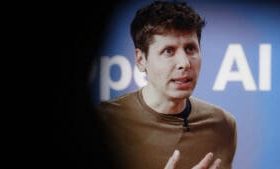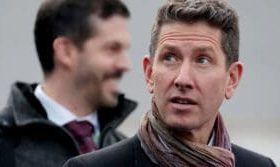
For a quarter of a century, Russell Wardrop has been in the same line of work—creating rainmakers.
As co‑founder and chief executive of KWC Global, based in Glasgow and London, Wardrop has made a career of helping lawyers, accountants and financiers learn the commercial skills business school often forgets: how to sell, lead and grow. His thesis is disarmingly simple: if learning and development is designed correctly and linked to tangible outcomes, it stops being an overhead and starts paying for itself.
‘Too much L&D is treated as a discretionary cost,’ he says. ‘It’s not quite entertainment, but it’s rarely embedded in strategy or measured against the top line. That’s a big miss—so we made it our mission.’
The spark: from lecture theatre to marketplace
Wardrop and his co‑founder—and wife—Sharon (pictured) began in academia. He had trained as an architect and developed a parallel career as a speaker; she studied law, relished the detail and, by his account, ‘loved a spreadsheet’. Between them they had deep experience in building and validating degree and postgraduate programmes. What they could see, and what many firms could not, was the chasm between technical excellence and commercial impact.
‘There are so many brilliant professionals who are never taught how to sell or influence,’ Wardrop says. ‘We built programmes that gave them those tools—and the rest is history.’
At the outset they chose a name you couldn’t ignore: Kissing with Confidence. They were not theatre coaches but business people with a promise of ‘fiercely direct feedback’ and practical drills. The offering has since matured into KWC Global and the Rainmaker Series, delivered worldwide to blue‑chip firms across law, accountancy and financial services.
Profit centre, not cost centre
The KWC method starts with the end in mind. ‘We have ROI front and centre from first client contact,’ Wardrop says. That’s not a vague aspiration but a design principle: define the behaviours that will move revenue, build the learning around them, and measure both the qualitative and quantitative shifts.
‘Training only works when it changes behaviour and boosts performance,’ he adds. ‘If what we do doesn’t achieve that, we fix it—or we stop doing it.’ The discipline extends to client service: KWC prides itself on a ‘relentless’ focus there, and on maintaining what Wardrop calls a world‑class Net Promoter Score.
The rainmaker’s toolkit
So what, in KWC parlance, makes a rainmaker? The firm’s curriculum blends leadership, sales and influence. Participants practise framing value, running tough conversations, navigating politics without losing their edge, and moving stakeholders from ‘maybe’ to ‘yes’. The constant refrain: outcomes.
‘We always ask: how does this move the needle?’ Wardrop says. ‘That’s the difference between an overhead and an investment.’
Missteps, momentum and the Zoom moment
Wardrop is candid about what he would change. ‘Plenty,’ he laughs. ‘But every misstep taught us something vital.’ If he has a single do‑over, it might be technology: ‘Had I embraced it sooner we’d be further ahead. Zoom was an unexpected lifeline in lockdown that took us global overnight.’ The lesson, delivered with trademark bluntness, is not to over‑analyse the past. ‘When you’ve longer to look back than forward it’s tempting to dissect everything. That’s not my thang. If I’d known more about business earlier we might be bigger—or bust.’
Who he admires
Two names come quickly. First, Dr Brian Williamson, the Stirling‑based serial entrepreneur. ‘He changed the way I think about business,’ Wardrop says. ‘Growth comes from clarity of vision and relentless focus on outcomes.’ The second is Gordon Ramsay—for reasons you can guess. ‘Unflinching honesty and high standards. A bit of fire never hurt anyone.’
The KWC way: straight talking, action, evidence
Wardrop’s own style is baked into the firm’s culture: plain‑speaking, action‑oriented and allergic to theatre for theatre’s sake. ‘Designed correctly,’ he repeats, ‘training becomes a profit centre, not a cost centre.’ That design is the difference between a day out of the office and a commercial intervention.
Advice for founders and professionals
Pressed for counsel to those starting out, Wardrop offers a terse checklist:
• Find your focus. Face the wall. ‘Get brilliant at something specific.’
• Learn to sell. Market yourself. Be visible. Technical mastery isn’t enough if no one knows.
• Build resilience. ‘It’s forged in the tough times. If you meet me, ask what my favourite recession was.’
• Be distinctive. ‘Find an angle and be, in some way, unique.’ The original Kissing with Confidence brand, and the promise of direct feedback, was precisely that.
• Flip the frame. ‘If you can turn what others see as a cost into a growth lever—like reframing L&D—you’ll build a business that lasts. Or, as Gordon Ramsay would say, you have a chance.’
On being outcomes‑obsessed
Wardrop bristles at the idea that training is soft. For him, the soft stuff is the hard edge of growth: the ability to win work, hold your price, lead teams and motivate colleagues. What matters is to prove impact. KWC’s engagements begin by agreeing the metrics that matter—new pipeline created, conversion rates improved, average fee uplift, client retention, cross‑sell, leadership scores—and end by reporting back against them.
This outcomes obsession is what clients remember. It’s also what has kept KWC relevant across cycles. Markets change, sectors consolidate, tastes in learning come and go; the need to grow never does.
If there is a unifying thread it is directness. Wardrop is the first to concede he doesn’t do corporate euphemism. But clients don’t hire him for euphemism. They hire him for momentum—and for the programme architecture, coaching and accountability that sustain it after the workshop high has faded.
The architecture looks simple because it is simple: focus, practise, apply, measure, iterate. Do the important things consistently and watch the scoreboard.
Wardrop has spent 25 years turning sceptics into salespeople and technicians into leaders. The formula is not secret, just rarely applied with rigour. ‘Find the behaviours that move revenue and embed them,’ he says. ‘Everything else is commentary.’
For firms wondering whether to spend on training this year, that’s the challenge: don’t spend—invest. Put ROI at the beginning, not the end. Design for outcomes. Measure what matters. And insist that everyone who touches a client can sell, influence and lead.
If you do all that, Wardrop suggests, you won’t be debating whether L&D is an overhead for long.
Read more:
From ‘Kissing with Confidence’ to KWC Global: how Russell Wardrop turns training into a profit centre






